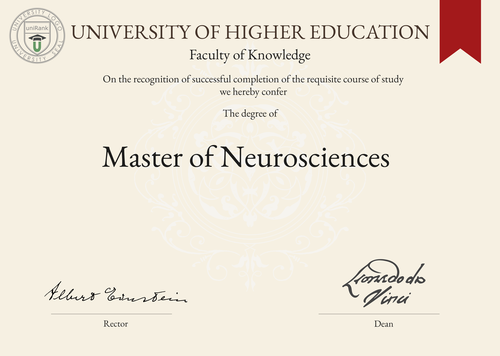
Master of Neurosciences (MNS)
Guide to Master of Neurosciences Program/Course/Degree
Master of Neurosciences (MNS)

Program Name
Master of NeurosciencesProgram or Degree abbreviation
MNSDuration range
The duration of the Master of Neurosciences program typically ranges from 1 to 2 years.Tuition range
The tuition fees for the Master of Neurosciences program can vary depending on the chosen country or university. It is recommended to check with specific institutions for accurate information.Overview
The Master of Neurosciences program is designed to provide students with a comprehensive understanding of the field of neuroscience. It focuses on the study of the nervous system, including its structure, function and development. Students gain knowledge in areas such as neuroanatomy, neurophysiology, neurochemistry and neuropharmacology.Curriculum Overview by year
The curriculum of the Master of Neurosciences program is typically divided into different modules or courses. The specific structure may vary depending on the university. However, a typical curriculum may include the following: Year 1: - Introduction to Neuroscience - Neuroanatomy - Neurophysiology - Neurochemistry - Research Methods in Neuroscience Year 2: - Advanced Topics in Neuroscience - Neuropharmacology - Neurodevelopment - Neurological Disorders - Research Project or ThesisKey Components
The key components of the Master of Neurosciences program include in-depth theoretical knowledge of neuroscience, practical laboratory skills, research methods and the ability to critically analyze scientific literature. Students also develop skills in data analysis, scientific writing and presentation.Career Prospects
Graduates of the Master of Neurosciences program have various career prospects in both academia and industry. They can work as research scientists, neurologists, neuropharmacologists, neurosurgeons, or pursue further studies at the doctoral level. They may find employment in research institutions, pharmaceutical companies, hospitals, or universities.Salary Expectations
The salary expectations for individuals with a Master of Neurosciences degree can vary depending on factors such as experience, location and job position. Generally, individuals in this field can expect competitive salaries, with the potential for growth as they gain more experience and expertise. For a more accurate understanding of salary expectations, you can utilize the Job Sites Search Engine, from our sister site jobRank, which searches over 4,600 job sites worldwide. Make sure to specify not only the job title but also the country you are interested in.Conclusions:
It is important to note that the duration, tuition fees, curriculum, key components, career prospects and salary expectations of the Master of Neurosciences program can vary depending on the chosen country or location of study, as well as the specific university. Prospective students are advised to research and compare different programs and institutions to find the one that best suits their needs and goals. Visitors interested in pursuing a Master of Neurosciences degree can search for programs offered worldwide through the uniRank World Universities Search Engine. This search engine provides a comprehensive database of universities and their respective programs, allowing individuals to explore options and make informed decisions about their education.World Universities Search Engine
search for Master of Neurosciences (MNS) and add the Location (country, state etc.) or specific University you are interested in studying at.
Query examples:
- Master of Neurosciences (MNS) United States
- Master of Neurosciences (MNS) United Kingdom online
- Master of Neurosciences (MNS) Australia international students
- Master of Neurosciences (MNS) University of California
- Master of Neurosciences (MNS) University of London tuition fees
- Master of Neurosciences (MNS) University of Sydney scholarships
Share Program/Course
Interesting? Share this program/course/degree info with your friends now.